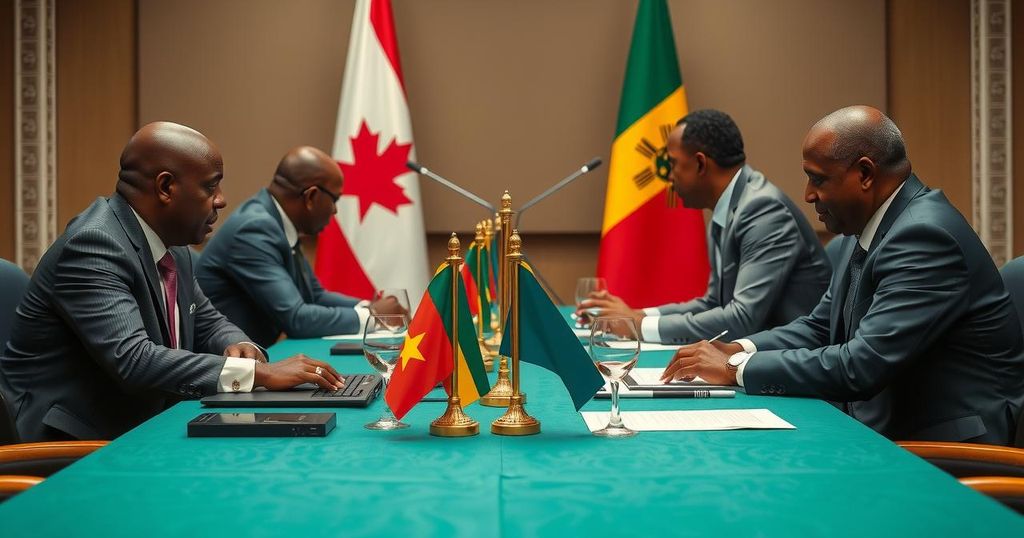Somalia and Ethiopia have restored diplomatic relations, ending a year-long rift that destabilized the Horn of Africa. The rift originated from Ethiopia’s agreement with Somaliland regarding its independence. A peace deal mediated by Turkey facilitated this reconciliation, and discussions on enhancing trade and security were conducted. However, unresolved issues, including Ethiopia’s sea access and regional tensions, persist.
On January 11, Somalia and Ethiopia declared the restoration of full diplomatic relations, concluding a year-long discord that had escalated tensions within the Horn of Africa. This significant development arose during the visit of Somali President Hassan Sheikh Mohamud to Ethiopia, where he and Ethiopian Prime Minister Abiy Ahmed committed to enhancing their bilateral ties through mutually recognized diplomatic missions in their respective capitals, as stated in a joint communiqué.
The estrangement originated from Ethiopia’s contentious agreement with Somaliland, a region that has sought independence from Somalia. The pact, offering to recognize Somaliland’s autonomy in exchange for access to a strategic Red Sea port and a military base, provoked significant backlash from Mogadishu, culminating in the expulsion of the Ethiopian ambassador in April and the severance of diplomatic relations. A peace accord brokered by Turkey last month facilitated this recent reconciliation, with both leaders emphasizing the importance of friendship and solidarity in their renewed agreement.
In addition to restoring diplomatic ties, President Mohamud and Prime Minister Abiy engaged in discussions to bolster trade and security collaboration, particularly against extremist groups endangering regional stability. However, several issues remain ambiguous, including the details surrounding Ethiopia’s proposed access to seaward resources, a matter previously suggested by Turkish President Recep Tayyip Erdogan.
Concerns surrounding Ethiopia’s earlier agreement with Somaliland continue to be a point of contention, as regional tensions have not abated. Notably, just hours prior to Mohamud’s trip, Somalia’s Foreign Minister Ahmed Moalim Fiqi met with counterparts from Egypt and Eritrea in Cairo to address security issues in the Red Sea. The Egyptian Foreign Minister unequivocally asserted, “The Red Sea and its security is subject only to the will of the countries on its coast, and it is absolutely unacceptable for any country not bordering the Red Sea to have a presence, whether military, naval, or otherwise.”
Egypt, Eritrea, and Somalia have formed a regional alliance in opposition to Ethiopia’s aspirations, with Egyptian forces participating in the African Union Support and Stabilisation Mission in Somalia (AUSSOM), aimed at countering Somali Islamist militants.
This recent restoration of diplomatic relations marks a pivotal moment in regional politics, yet critical questions persist regarding Ethiopia’s agreements and the implications for future collaborations in the Horn of Africa.
The recent diplomatic rapprochement between Somalia and Ethiopia stems from a complex history involving territorial and political disputes, particularly regarding Somaliland. The year-long rift was precipitated by Ethiopia’s controversial recognition of Somali independence, leading to a deterioration in bilateral ties. The peace agreement mediated by Turkey served as a catalyst for reconciliation, highlighting the need for cooperation in areas such as trade and security amidst ongoing regional tensions and the threat posed by extremist groups. The dynamic nature of the Red Sea’s geopolitical landscape further complicates these developments, underscoring the necessity for ongoing dialogue among regional powers.
In conclusion, the resumption of diplomatic relations between Somalia and Ethiopia signifies a hopeful advance towards stabilizing the Horn of Africa. Nevertheless, unresolved issues regarding the details of Ethiopia’s agreements with Somaliland and ongoing regional tensions necessitate vigilant diplomacy. The collaboration on trade and security initiatives reflects an important step in fostering stability, yet the intricate geopolitical context hints at potential challenges that lie ahead. Continued engagement among regional stakeholders remains essential for navigating these complexities.
Original Source: www.firstpost.com






